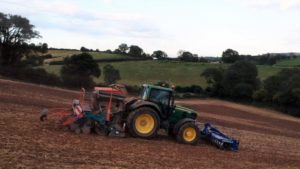Changes to Agricultural Property Relief (APR) from Inheritance Tax (IHT) will be welcomed by farmers and environmentalists following the Chancellor’s Budget on Wednesday.
The changes, which ensure that APR is applicable to land entered into environmental schemes, and do not limit APR on let land, provide welcome certainty, says Jeremy Moody, secretary and adviser to the Central Association of Agricultural Valuers. “We worked hard to achieve this response to the consultation issued a whole year ago, to which we submitted a detailed, 71-page analysis, and look forward to working with the Government in taking these decisions forward.”
In his final Budget of this Parliament, Jeremy Hunt said that APR will be extended from April 2025 to transfers, on death and lifetime, of farmland put into qualifying environmental agreements anywhere in the UK.
“Almost cost-free, given farmland’s eligibility for APR, this will remove IHT as an issue for farmers and landowners looking at environmental commitments. These options can now be considered on business and personal reasons, not pre-empted by fear of IHT and its 40% rate,” says Mr Moody. “It also answers a landlord’s concern about tax status if a tenant enters such an agreement, and gives environmental bodies a positive interest in APR.”
Mr Hunt also confirmed that APR will remain available for all let land, not limited to lettings for eight years and more. Although the Rock Review claimed that this proposed limit would encourage longer lettings, CAAV analysis showed that it would have the opposite effect. “We found that it would have discouraged some landlords from letting at all, and others to reduce terms to just eight years, which would have been very damaging to the let sector,” says Mr Moody. “That has been avoided and the let sector is now better placed for its important role in the coming changes.”
In addition, the Government has committed to establishing a joint Treasury and HMRC working group to explore taxation of ecosystem services, like the sale of carbon credits and biodiversity net gain agreements. “There are currently all sorts of tax uncertainties and fears about environmental transactions. We need to sit down and look at common situations, and understand more clearly what’s going on in these emerging markets,” says Mr Moody. “If we then identify tax problems which need changes in the law, then we can answer them in a measured, satisfactory way.”
Even the prospect of a potential change in Government this year should not undermine the progress made, he adds. “I think the commitments are very likely to stand. A working group analysing transactions is hardly likely to cause an incoming Labour government any particular qualms. And the extensions to APR are likely to cost the Treasury no money at all. Cost-free to the taxpayer, the Treasury has opened doors, avoided distortions and given certainty. These decisions give the farming and environmental communities a platform for the future.”
- For more information visit www.caav.org.uk.
About the CAAV
The Central Association of Agricultural Valuers (CAAV) is a specialist professional body representing, qualifying and briefing over 2700 members practising in a diverse range of agricultural and rural work throughout England, Wales, Scotland and Northern Ireland.
CAAV members are agricultural and rural valuers who provide professional advice and valuation expertise on issues affecting the countryside from tenancy matters to sales and purchase of farms and land, from taxation and compulsory purchase to auctioneering, and from conservation issues to farming structures.
We are always happy to speak to the press – if you have any queries please contact Olivia Cooper, partner at Agri-hub PR services, on 01392 840009 or email [email protected].




